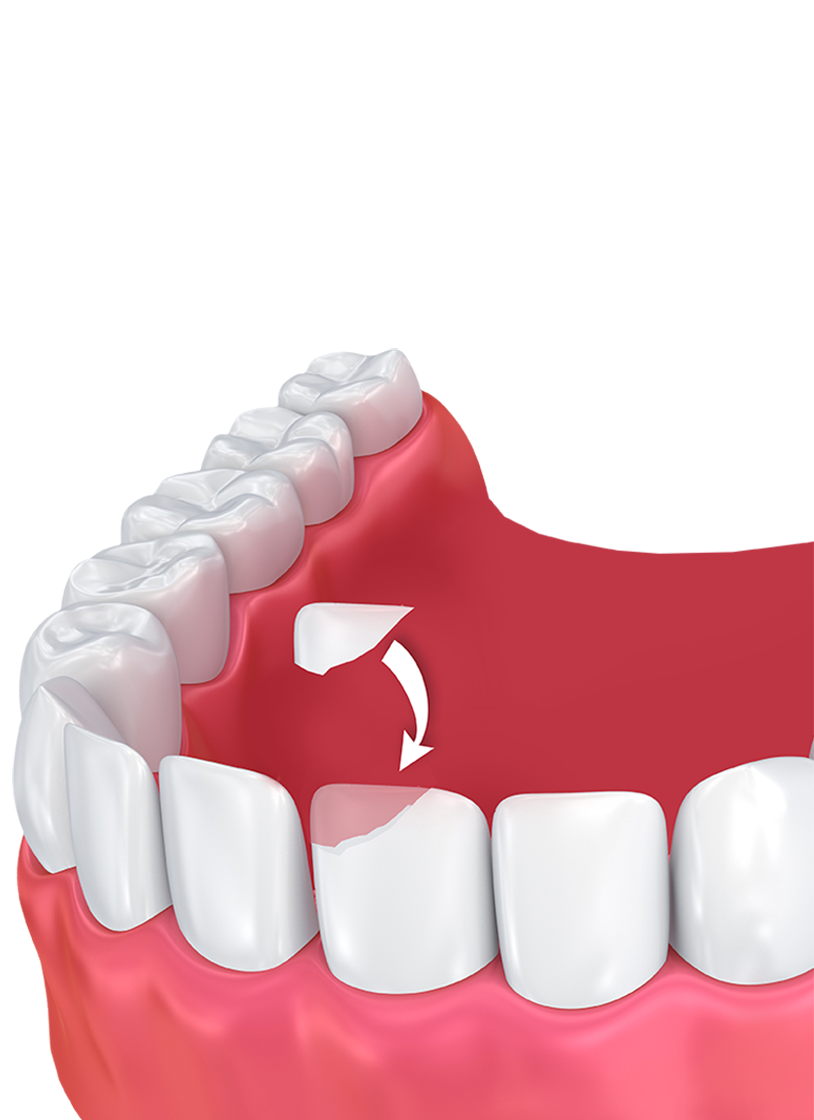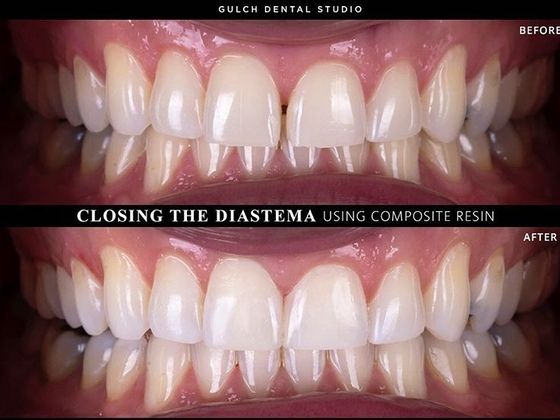
Dental Bonding

Dental Bonding Offers a Quick and Affordable Way to Enhance Your Smile
A Cost-Effective Option
Compared to other cosmetic dentistry options, dental bonding is a much more affordable treatment. This procedure can conceal a range of concerns, including gaps, stains, cracks, and disproportionate teeth.
Minimal Tooth Alteration
Dental bonding involves a gentle etching process, making it a reversible treatment. In contrast, your doctor will need to reshape the tooth before placing a porcelain veneer.
Shorter Treatment Time
We can perform bonding in a single visit to our dental office in Nashville, TN. Since there is minimal preparation involved, the process typically takes less than an hour to complete.
Take a closer look at the dental bonding process...
What can bonding address?
Dental Bonding Is a Versatile Treatment Which Can Conceal a Wide Range of Concerns
Chips and Cracks
Minor damage, such as small chips and cracks, can easily be filled with composite resin, the material which is used during dental bonding.
Small or Worn Teeth
Your doctor can use bonding to adjust the size of your teeth. This process can be used for patients whose teeth have been worn down due to clenching or grinding as well as for naturally small teeth.
Minor Misalignment
Bonding can also conceal small gaps or other types of minor misalignment to make your smile appear more uniform and symmetrical.
Stubborn Stains
Some types of staining or discoloration are resistant to teeth whitening. Your doctor can perform dental bonding to cover those stains for a brighter, more brilliant smile.
I've heard porcelain veneers are better...
Our Team Can Help You Weigh Your Options
Porcelain veneers are used to treat many of the same issues as dental bonding. While veneers do offer a more lifelike and durable result, they are also more expensive than bonding. In addition, veneers have additional candidacy requirements which may prevent you from receiving them.
At our pratice, we are dedicated to providing patients with quality dental care that will help them achieve their cosmetic goals. Our team can discuss your options with you and ensure that you are provided with the best dental solution for your needs.

So what actually happens during dental bonding?
Dental Bonding Is a Simple But Precisely Customized Process
Treatment Planning
You will first meet with your dentist to discuss your cosmetic goals and concerns. He can use this information to design a personalized treatment plan.
Color Matching
Your doctor will shade-match the composite resin material to match the surrounding teeth and achieve optimal results.
Application
Your dentist will gently etch each tooth being treated and apply the resin, carefully molding it to achieve the desired shape and size.
Curing
Using a specialized light, your doctor will perform the curing process to harden the resin.
Polish
As a final step, your doctor will polish the treated teeth to match the shine of natural enamel. This ensures the most realistic results.
Let's dive deeper into the process...
Repair Minor Chips, Cracks, & Stains with Dental Bonding
Dental bonding can be used to conceal imperfections such as minor chips, cracks, and stains. This conservative yet effective cosmetic solution can be completed in just one appointment. Gulch Dental Studio in Nashville, TN, strives to provide patients with outstanding results in a comfortable, luxurious environment for a memorable experience. Our doctors are trusted professionals who can provide precise dental bonding placement that blends seamlessly with your teeth. We can also perform complementary cosmetic procedures for a flawless, natural-looking smile.
What is Dental Bonding?
Dental bonding is a cosmetic procedure that conceals imperfections with composite resin, creating the appearance of a fully restored tooth. Composite resin can be shaped and polished to match your surrounding teeth. This material can be used to lengthen teeth, fill gaps, reshape a tooth, or conceal discoloration, and is virtually unnoticeable to others. Composite resin is so durable that our doctors also use it to create tooth-colored dental fillings.

Benefits of Dental Bonding
This procedure offers patients several unique benefits:
- Affordability
- Conservative treatment
- Versatile
- Appropriate for most patients
- Convenient
- Preserves more natural structure of your tooth than other options
This treatment can also be used in conjunction with restorative procedures to strengthen teeth. While dental bonding can serve many purposes, it is only a viable solution for minor dental imperfections. Your doctor can provide a complete evaluation to determine whether dental bonding is the right fit for you.
After Your Procedure
Within the first 48 hours of your treatment, you should avoid dark beverages, cigarettes, and other staining substances. Once this period has passed, your bonded tooth will not require special care. You should, however, avoid biting your nails, chewing on pens, or other hard objects that may chip the material. As long as you continue to practice good oral hygiene and attend regularly scheduled cleanings and exams, bonding can last for years.
Our Patient Results









